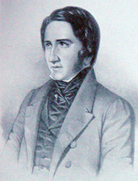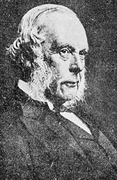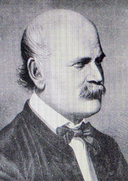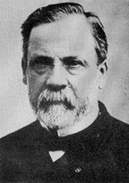|
Dr John Bunnell Davis established a clinic which over the next century had seven different titles, starting with the Universal Dispensary for Children in London and ending in the 20th century as the Royal Waterloo Hospital for Children and Women. Davis was a man of tremendous energy and drive and set up the clinic in 1816. He also planned for progress to having a new building, which would also accommodate inpatients. When this was near completion Dr Davis suffered sudden death in 1824. This removed the dynamism and positive drive of the clinic to be the first children’s hospital in Britain. In 1824 the clinic had a staff of three physicians and three surgeons but the unexpected death of Dr Davis deprived it of its dynamism and forward drive. Inpatient admission was delayed to 1856.
A separate factor which did have an influence on the subsequent development of paediatrics was the action taken by King George IV in allowing the development of Universities in England. This commenced in the 1820s with King’s College in London and Manchester leading the way and the monopoly of the Oxford and Cambridge Universities was broken. This resulted in the admission of many to University who had been banned in the previous centuries. In 1842 Dr Charles West was appointed as a physician (aged 28) to the Royal Universal Infirmary for Children and he tried to stimulated progress in the clinic and committee to develop its potential for inpatient care. Ultimately he resigned in 1849. Within two months he had arranged a meeting held in Dr Bence Jones house and from that |
progress was made to develop the Hospital for Sick Children in Great
Ormond Street (GOS) which opened in 1852. The Board of the Hospital for Sick Children appointed Dr Charles West and Dr William Jenner, Physicians, and Mr G D Pollock, Surgeon who was followed by Mr Athol Johnston. West did disagree with the Chairman of the Board of Governors to a significant extent over the years. West was the son of a Baptist minister but he later decided to change his religion to Roman Catholicism. This and some other factors resulted in him ultimately resigning from GOS. Dr West like some other paediatricians before and after had a personality which could raise significant divisions of opinion and break working relationships. Attitude of Dr West and at least some of his colleagues at the outset was that there were no surgical problems in childhood, which demanded special skill or study. He opposed appointment of a surgeon but the Board ruled otherwise. Following the earlier pattern in Europe, Britain in the second half of the 19th century had an “epidemic” of hospitals - there being 38 Children’s Hospitals by 1888. Elizabeth Lomax in her book Small and Special records the ‘explosion’ of children’s hospitals in the second half of the 19th century. This also was the time at which the term paediatrics came into use instead of the clumsier ‘diseases of children’ and has been documented by Professor Peart in the Archives of the Diseases of Children (2011). |
|
The final comment on the 19th century is to focus on the outstanding studies which made major contributions to the development of modern care. These include the development of anaesthesia to which James Young Simpson made a major contribution in Britain following the initial use in America; Joseph Lister who introduced antiseptic surgery
|
when he was Professor of Surgery at Glasgow; the Hungarian Ignaz Semmelweis in Vienna who diagnosed that puerperal fever was carried from patient to patient by the students; and Pasteur with his development of the bacteriological understanding of infections and the extensive progress subsequently in that field.
|





